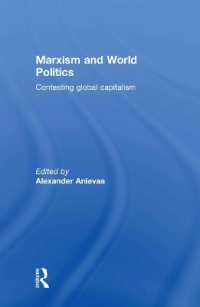- ホーム
- > 洋書
- > ドイツ書
- > Humanities, Arts & Music
- > Philosophy
- > general surveys & lexicons
Full Description
This book presents the history of metaphysics through transcendental phenomenology and interpretations of Kant, Fichte, Cohen, Windelband, Rickert, Husserl, Scheler, and Heidegger. Slama introduces the "praxiologico-transcendental" figure where transcendental knowledge opens up a "praxiological" life of subjectivity for whom reality becomes a continual practical problem. In so doing, this book also establishes the principles of a "praxiological" thinking of perception, starting from the conceptuality of the "tool", which is grounded in the praxiologico-transcendantal. Thus, the author presents and argues for this unitary figure of transcendental philosophy as a crucial figure of metaphysics. This book appeals to students and researchers working in phenomenology and metaphysics.
Ce livre propose une histoire de la métaphysique à partir de la figure de Kant, et avec la phénoménologie transcendantale comme centre. À partir d'une lecture précise d'auteurs centraux de la tradition transcendantale (Kant, Fichte, Cohen, Windelband, Rickert, Husserl, Scheler, Heidegger), il fait l'hypothèse d'une figure "praxiologico-transcendantale" où la connaissance transcendantale ouvre une vie "praxiologique" de la subjectivité, qui se trouve ainsi frottée au réel qui devient un incessant problème pratique pour lui. Ce faisant, ce livre établit les principes d'une pensée de la perception "praxiologique", à partir de la conceptualité de l' « outil ». Il s'agit in fine de donner une figure unitaire de la philosophie transcendantale dans son ensemble, comme moment crucial dans l'histoire de la métaphysique.
Contents
Introduction.- Première Partie.- Transcendantalisme Pratique Du Néokantisme Et Anti-Transcendantalisme De La Phénoménologie.- Chapitre Premier.- Windelband Et La Pr-Axiologie Transcendantale.- Chapitre Deuxième.- Rickert Et La Pr-Axiologie Transcendantale.- Chapitre Troisième.- Husserl Critique De Rickert : L'intentionnalité Contre Le Transcendantalisme Pratique.- Chapitre Quatrième.- Heidegger Contre La Théorie De La Valeur : L'usage Et La Vie.- Deuxième Partie.- L'anti-Transcendantalisme Phénoménologique : Praxiologie.- Chapitre Premier.- Synthèse Et Praxis Non Transcendantales.- Chapitre Deuxième.- Max Scheler Et L'intentionnalité Pratique Et Contextuelle.- Chapitre Troisième.- Heidegger Et L'intentionnalité Pratique.- Troisième Partie.- Phénoménologie Transcendantale : La Réduction Éthique.- Chapitre Premier.- Husserl Et La RéductionTranscendantale Éthique.- Chapitre Deuxième.- Max Scheler Et L'éthique De La Personne.- Chapitre Quatrième.- Le Tournant Transcendantal D'être Et Temps : Les Réductions Éthiques.- Quatrième Partie.- Retour À Kant. Kant, Fichte, Cohen, Heidegger : Transcendantal Et Liberté.- Chapitre Premier.- La Pratique Transcendantale Chez Kant Et Fichte.- Chapitre Deuxième.- Kant Et La Possibilité D'une Expérience Du Transcendantal.- Chapitre Troisième.- L'analytique, Le Sujet Transcendantal, L'imagination : Liberté.- Conclusion Générale.








